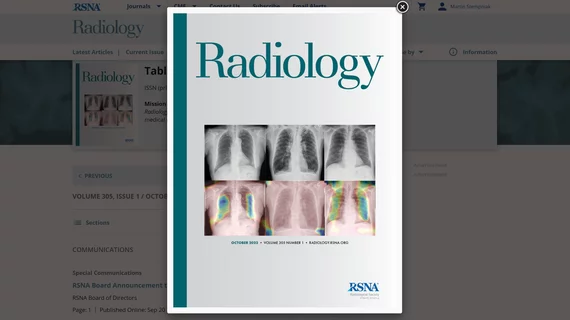RSNA to shutter print journals
Collectors of medical memorabilia may want to plan on preserving the January 2023 print edition of Radiology.
That’s because the current issue, October 2022 (Vol. 305, No. 1), includes a brief message from RSNA’s board of directors that officializes a decision made over the summer to go online-only after printing and mailing that issue [1].
The authors tie the scheduling to Radiology’s 100th anniversary, noting the peer-reviewed periodical first rolled off the press in 1923.
RSNA says the move away from paper will “support the growth of dynamic multimedia-rich content” while responding to changing reader preferences.
“Radiology has grown exponentially over the past century, becoming the most influential publication in medical imaging,” adds Linda Moy, MD, the journal’s editor designate, in the October-edition message. “I look forward to bringing our readers the earliest possible access to relevant, time-sensitive research while reducing the environmental impact of our publication.”
The society is also taking its journal RadioGraphics all-digital after printing and mailing the November/December issue.
That journal’s editor, Christine Cooky Menias, MD, says the modernization gives RadioGraphics the “opportunity to enhance the value of our articles with exceptional, seamless multimedia content—including podcasts, slides and videos—that greatly contributes to the lifelong learning goals of our readers.”
The official announcement follows three months after Radiology saw its journal impact factor skyrocket from 11.105 in 2020 to 29.146 in 2021, according to Clarivate’s Journal Citation Reports.
RadioGraphics also enjoyed a big bounce, more than doubling its impact factor between 2015 and last year.
The announcement does not mention the RSNA journals Radiology: Artificial Intelligence, Radiology: Cardiothoracic Imaging, Radiology: Imaging Cancer or RSNA Case Collection.
The society board’s full official message is here.

